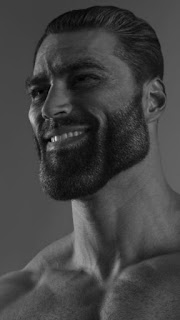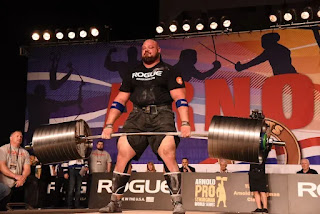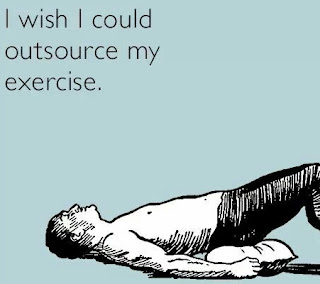 |
| "By my calculations, you're not lifting optimally." |
I encounter with increasing frequency the attitude that “less is more” when it comes to physical training. This sentiment about physicality seems to originate from two sources: time management and risk mitigation. Those with this conception of training figure backwards from their goal, but in doing so are unable to observe the process that will carry them forward to realization. Often, once the minimum is determined the optimal is defined. These “optimalists” are usually new to weight training.
Optimalists prioritize managing time and risk. Then other factors are accounted for down to minutiae, with the most pathological concerned with the more inconsequential, or things not fully knowable (like genetic potential). Once sufficient factors at play are known, or believed to be known, then the optimal course to the finish line is planned backwards – the path of least resistance, of least energy expenditure, of least effort, of least trying.
Why
is this so?
Because, for the sake of
efficiency, the optimalist does not set out to achieve until sufficient information
is collected; a hoard is amassed, much of it as useless as stacks of People
magazine. Optimalists act as if all factors can be accounted for in conceiving
the path towards their goal. They want physical development fast with the least
exertion necessary, believing that foreknowledge of the journey – before the
first step is taken – guarantees the least sweat while earning the greatest
reward.
This disregards the
possibility of learning new information that benefits the process while in
the process. It also fails to recognize that of the many factors at play in
physical development, not all have known upper and lower limits, or are even
accurately approximated, and of those factors, many cannot be reasonably
determined until the training process is already underway. Some may never be known
but exist merely as faithful estimates (such as genetic potential).
 |
| "What's optimal?" |
Optimalists want to
master their bodies as if it were a detached instrument from their minds. Like they
were a disassociated omnipotent musician, and once total knowledge of their
instrument is had, only then will they play, for the very first try guarantees
the most beautiful song. If mastery was not achieved before trying, they risk
failure. Something to be avoided at all costs, even if it means not trying at
all, so thinks the optimalist. This is absurd because it is the process of
learning the instrument and combining a variety of melodies, with some better
than others, that develops a musician one day capable of composing a
masterpiece.
Sometimes, optimalists
imagine their whole story arc at the character creation screen of a
role-playing game. After selecting a class, perhaps an archer, or knight, or
mage, a certain number of points are given to distribute among attributes to
tune their character and optimize their play style. This is silly because it
combines biological determinism (character class and attribution points) within
a predestined fantasy world of which the player already knows more about than
the world they will experience in real life: the gym. Their live action role
play of physical development is make-believe (often without the make).
The optimalist acts as if
they have (or can have) total knowledge of the class and abilities of
their real-life bodies while living in an equally known world that can be
optimized through their character’s intrinsic qualities – all without playing a
single minute of the game. Playing the game then becomes mere button pushing,
with any experience in the process being frivolous. The entire act grows tedious,
and when so, effort wanes (no wonder why such people never achieve much in the
gym).
Any seasoned lifter knows
of such people. Those who cannot figure out that it is not the lack of a perfect
plan that is keeping them from making progress, it is their constant seeking
of the optimal that risks keeping them at the minimal.
So, the optimalist quits
or changes their program continuously, hoping that with a better class and
strategy, a reset will prove more fruitful and efficient. Self-defeating and inefficiency
incarnate. The antithesis to, and a surefire means out of, the pitfall of optimalism.
Exactly the self that needs defeating. (Yes, that is an argument for program
hopping.)
Optimalists
have never ending questions about trivial aspects because getting an answer from
someone else is easier than figuring it out for themselves. While learning from
others is beneficial, some things are unknowable unless one experiences it
themselves. Optimal is unknowable until limits are discovered, and a litany of
other factors, each of which more individual until their impact on development
becomes trivial.
By mastering physical
training trivia, the optimalist prioritizes collecting information that orbits achievement. They collect satellites without having a body to gravitate
them. In finding their way out of optimalism, how much of those supposed facts
about lifting, biology, and nutrition, becomes space junk? (Most of it.) That
is the crux of the problem. Their knowledge is not anchored by experience, and
it becomes the very thing that inhibits them until they try and learn what is
genuinely best for them.
 |
| Someone should tell him that wide stance conventional is not optimal. |
Physicality is the trying.
Physical development requires doing until finding the answer that cannot be had
secondhand. Such processes befuddle the optimalist because what they do not
know cannot become known until they discovered it. Once they do, the answer is
theirs alone; their optimal.
The
new gym goer asks, “I’m going to run XYZ-program. Is it optimal for me?”
“Do
it and see.” Replies the veteran lifter.
There
is little reason for the veteran lifter to ponder such minutiae for someone
else. Perhaps they were once an optimalist too. Or, like me, they were the new
guy in the gym trying hard to keep up with more experienced lifters, and therefore
unconcerned with optimal. Instead, their day-to-day performance is what
mattered.
Was I
very sore the next day? Sometimes.
Did
it regress my physicality? Never.
Once I was on my own, the
justification for lifting this way or that became to see if I can.
It has been that way for years. It is all that is required. It is my optimal.
The
optimalist, seeking knowledge over experience, hopes to prioritize efficiency
over discovery. But they fail to recognize that in whatever source their energy
is vested in, the optimal remains a mystery covered by faith until their own acts
produce the desired outcome. Once achieved, that course is deemed optimal ex
post facto.
But
was it?
Could
it have been done faster with less effort? Is that even answerable without
trying something else and comparing results? Should that comparison be attempted,
to truly discover optimal, doesn’t the overall process become less so (or at
the very least risk it) by doing more than what may be necessary? Optimalists
suffer in the purgatory between certainty and discovery because once they
physically try what was thought optimal and it is found not to be, their endeavor
slows to avoid risking further inefficiency. In doing so, they risk their goal,
for the goal was what is optimal – not physical development.
Preventing
wasted time and undue risk is the heart of the optimalist desire. Second to
that is attaining sufficient knowledge to justify their actions and results. Last
comes the trying. Why not let hard work, consistency, and patience produce results
that justify themselves?
To
the optimalist: Do more because less is just as risky and inefficient, and if
you want to gain size and strength optimally, try
trying.
 |
| Peak optimalist. |